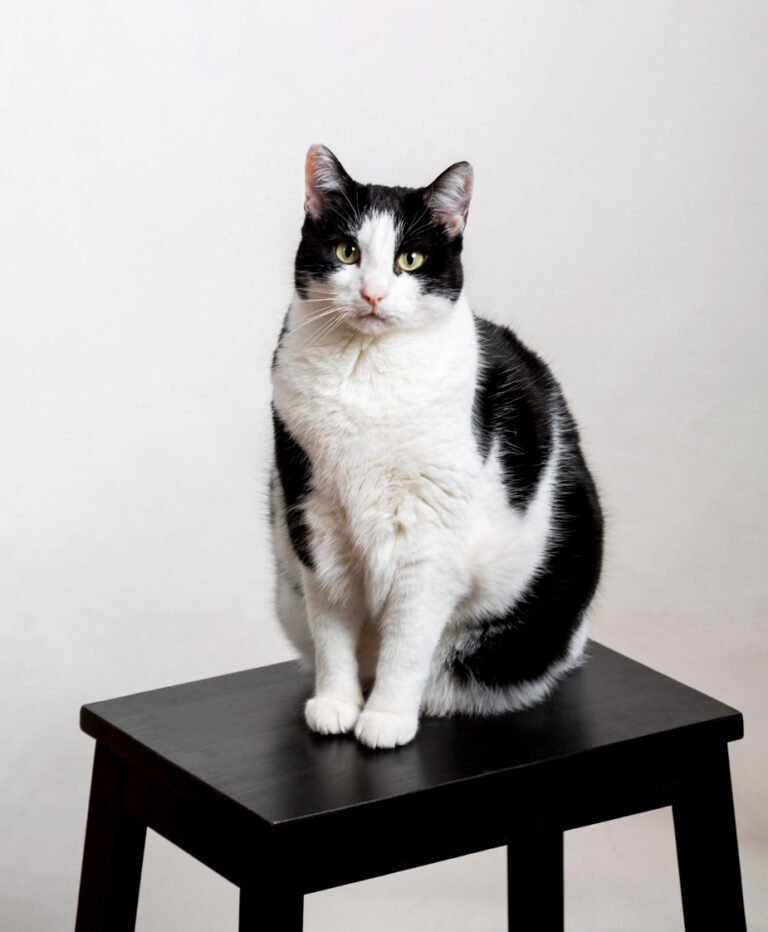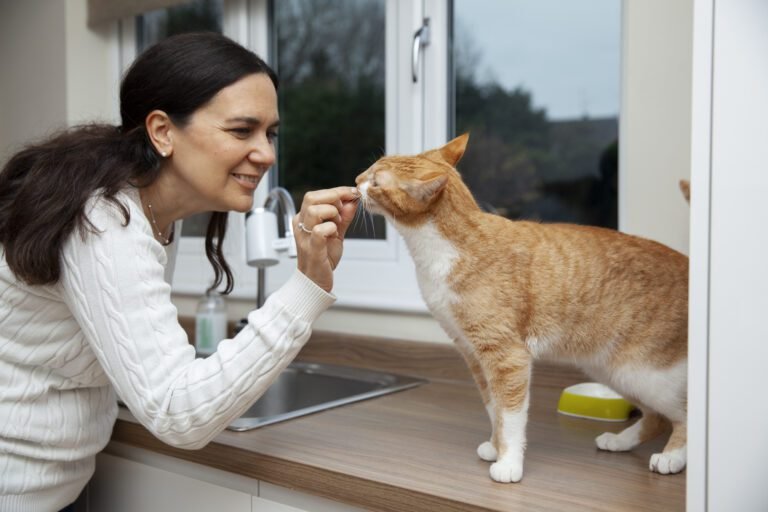Your cat didn’t bite you “for no reason”. There’s always a reason, even if it doesn’t make sense to us. Most cat bites are a form of communication—often a sign of overstimulation, fear, or confusion. It’s frustrating. One minute your cat’s rubbing up against you like you’re best friends. The next, chomp—a quick bite, then a blank stare.
I’ve been there. And if you’re reading this, chances are you’re confused, a little hurt, and wondering, Why did my cat bite me for no reason?
The truth is, cats don’t bite out of the blue. We just tend to miss the signals. This article will help you make sense of it.
What’s Behind the Sudden Bite?
Cats use body language more than meows to talk to you. Biting is one of their louder ways of saying “enough.”
Most cat owners expect pets to behave like dogs—loyal, predictable, always in the mood for cuddles. But cats? They run on a different system.
They give subtle signs before biting: tail twitching, ear rotation, even a quick freeze. Ignore those, and the bite shows up next.
It’s not always aggression. Sometimes it’s their way of showing overstimulation, mild annoyance, or even misplaced affection.
Types of Cat Bites and What They Mean
1. The Gentle Nibble
It’s not meant to hurt. This “love bite” is a soft nibble, often during petting or playtime.
Ever had your cat gently bite your hand, then look at you calmly?
That’s common during affectionate moments. It’s almost like a toddler hugging too tight—they just don’t know their strength.
This kind of bite isn’t about pain or warning—it’s closer to grooming behavior.
Multimedia Suggestion:
Include a short video clip of a cat giving a “gentle bite” while being petted. This helps readers see the difference.
2. The Warning Bite
This bite comes fast. Usually after petting for too long or ignoring warning signs.
Your cat’s tail might twitch. Eyes narrow. Ears go sideways.
You keep petting. They bite. That’s not random—it’s overstimulation.
It’s their way of saying, “That’s enough.” Cats have sensory limits. What feels soothing to us might start to overwhelm them.
Common Reasons Cats Bite Without Warning
1. Overstimulation
Too much touching can overload your cat’s senses. They bite to make it stop.
Think of it like this: You’re trying to relax, and someone keeps poking your shoulder. Eventually, you snap. Cats do the same—with teeth.
2. Fear or Startle Reaction
If your cat bites suddenly after a loud sound or quick movement, it’s likely fear-based.
They’re not thinking—they’re reacting. Just like you’d flinch or yell if someone popped a balloon behind you.
3. Redirected Aggression
Your cat sees a threat (like another cat through a window), gets worked up, and bites the nearest thing—you.
It’s not personal. They can’t get to the threat, so their energy turns elsewhere.
Data Suggestion:
Add a statistic: “According to the Cornell Feline Health Center, redirected aggression is one of the top five causes of sudden cat bites.”
Source: Cornell University’s veterinary behavior research.
4. Play Aggression
Young cats and kittens often bite as part of play. They treat your hand like another cat.
That’s why experts say never use your hands as toys. It confuses their play boundaries.
5. Medical Pain or Discomfort
Sudden biting during petting can mean your cat is hurting somewhere.
If they bite when you touch a specific area—like the back, belly, or hips—it could signal pain.
Infections, arthritis, or even dental problems can lead to this kind of behavior.
Signs Your Cat Might Bite (Before They Do)
Cats give warning signs. We just miss them.
Here’s what to look for:
-
Twitching tail or skin
-
Sudden head turns
-
Wide pupils
-
Ears shifting or flattening
-
Sudden freeze or pause during petting
Infographic Suggestion:
Create a simple “Bite Warning Checklist” graphic showing visual signs like tail flicking, ears back, or stiff body posture.
Knowing what to spot is half the battle.
Why Does My Cat Gently Bite Me?
Gentle biting is often your cat’s way of bonding, playing, or saying “I like you, but stop.”
This usually happens during petting. It may feel confusing, but it’s normal. They’re not angry—just overstimulated or being playful.
Some cats mimic grooming with their owners. Gentle nibbles are part of that behavior. But it can still turn into a harder bite if they get too excited.
Think of it like a tap that slowly gets firmer—if you keep petting too long.
How Do You Stop a Cat from Biting?
The best way to stop biting is to understand your cat’s triggers and stop before they get upset.
Once you know why it’s happening, you can start managing it.
Here’s how to make it better:
1. Learn Your Cat’s Limits
Most cats have a petting time limit. Some love belly rubs. Others hate them.
Notice when the tail starts twitching or ears shift. That’s your stop sign.
2. Don’t Use Hands as Toys
Use wands, feathers, or toy mice.
Your hands are for love—not war. Let them learn that early.
3. Reward Calm Behavior
Treats work. So does praise. When your cat plays nicely, give a snack.
Reinforce what you want, and they’ll do more of it.
4. Give Space When Needed
Sometimes your cat just needs alone time. Respect it.
If they walk away, don’t chase or pick them up. Let them cool down.
5. Check for Medical Issues
If biting happens out of the blue and keeps happening, call your vet.
When Should You Be Worried?
If the biting is:
-
Frequent and intense
-
Breaking skin
-
Paired with hiding or hissing
-
Happening during every petting session
Something more might be going on.
It could be medical, or it could be anxiety-related. Either way, it’s worth getting a professional opinion.
A vet or certified animal behaviorist can help rule things out.
Multimedia Suggestion:
Include a short expert interview video with a vet or behaviorist explaining medical causes of sudden aggression.
Let’s Talk About You
If you’ve been bitten, you’re not alone. And it’s okay to feel upset or even rejected by your cat.
But remember, cats don’t think like humans. Their bite isn’t revenge or hate—it’s a message.
Think of it like reading a book in a language you don’t speak. At first, it’s confusing. But once you learn the signals, it starts to make sense.
Give yourself time. Give your cat space. Things can get better.
Final Tips That Help
Here’s a list you can stick on your fridge:
-
Watch their tail—it tells stories.
-
Quit petting while things are calm.
-
Use toys, not hands.
-
Reward with treats when they’re gentle.
-
Visit the vet if the biting feels “off.”
-
Don’t punish—just understand.
-
Give them their space when needed.
These little changes make a big difference.
Summary (Simple and Direct)
-
Why did my cat bite me for no reason? Likely overstimulation, fear, or confusion.
-
Why does my cat gently bite me? It’s usually affection or play.
-
How do you stop a cat from biting? Understand their triggers, stop early, use toys, and reward good behavior.
-
Should you worry? Yes, if biting is frequent, intense, or unusual—talk to your vet.
Infographic Suggestion:
End the article with a summary graphic showing:
Bite type
What it means
What to do
Final Thought
Your cat isn’t mean. They’re not moody for no reason. They just speak a different language—and you’re learning it.
That one bite? It’s not the end of your bond.
It’s just one sentence in a bigger conversatioN





